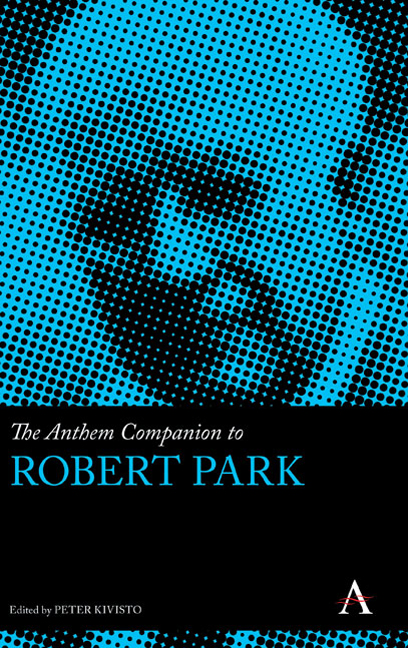Book contents
- Frontmatter
- Contents
- Introduction: The Legacy of Robert Ezra Park
- Chapter 1 A Twisted Path: Park, Gender and Praxis
- Chapter 2 Robert Park's Journey into Sociology
- Chapter 3 Beyond “Get the Seat of Your Pants Dirty in Real Research”: Park on Methods
- Chapter 4 The Basic Components of Social Action: Mead versus Park
- Chapter 5 Robert E. Park: Neglected Social Psychologist
- Chapter 6 Robert E. Park's Theory of Assimilation and Beyond
- Chapter 7 Robert Park's Marginal Man: The Career of a Concept in American Sociology
- Chapter 8 Marginality, Racial Politics and the Sociology of Knowledge: Robert Park and Critical Race Theory
- Chapter 9 The Cities of Robert Ezra Park: Toward a Periodization of His Conception of the Metropolis (1915–39)
- Chapter 10 The Impact of Robert E. Park on American Sociology of Religion
- Chronology
- Contributors
- Index
Chapter 4 - The Basic Components of Social Action: Mead versus Park
Published online by Cambridge University Press: 10 January 2018
- Frontmatter
- Contents
- Introduction: The Legacy of Robert Ezra Park
- Chapter 1 A Twisted Path: Park, Gender and Praxis
- Chapter 2 Robert Park's Journey into Sociology
- Chapter 3 Beyond “Get the Seat of Your Pants Dirty in Real Research”: Park on Methods
- Chapter 4 The Basic Components of Social Action: Mead versus Park
- Chapter 5 Robert E. Park: Neglected Social Psychologist
- Chapter 6 Robert E. Park's Theory of Assimilation and Beyond
- Chapter 7 Robert Park's Marginal Man: The Career of a Concept in American Sociology
- Chapter 8 Marginality, Racial Politics and the Sociology of Knowledge: Robert Park and Critical Race Theory
- Chapter 9 The Cities of Robert Ezra Park: Toward a Periodization of His Conception of the Metropolis (1915–39)
- Chapter 10 The Impact of Robert E. Park on American Sociology of Religion
- Chronology
- Contributors
- Index
Summary
Social action remains for interactionists the most important idea in their entire conceptual tool kit (Blumer 1969, 55; Cook 1993, 68– 70, 166– 69, 182; Faris 1945, 426; Kaplan 1963, 32– 33; 358– 63; Morris 1970, 9– 12; Rucker 1969, vi, 5– 6). If one wants to avoid the mistake of reducing a society or a group to a conscious mental state floating around somewhere in people's skulls (see, e.g., Cooley 1902, 1909; Pruss 1999; Schutz 1967) or ossifying it into a social structure or system lodged wholly in a world outside their minds (see, e.g., Black 1995; Durkheim 1938), then one must locate the society or group in the social action that occurs both in people's minds and beyond their skins, right under their noses (Blumer 1969, 6– 7; 1975, 1981, 144; Park and Burgess 1924,18; Mead, 1929a). Park (1927, 15, emphasis added) underscores this point with following argument: “The point of departure is, properly, not structure, but activity. The thing which gives a community the character of a society is not its structure, but its capacity for concerted action.” In fact, one could further argue that human beings are “social animals” precisely because they could not have survived for very long as a species without engaging in social action. Without constant attention from their parents for years on end, human infants would perish (Blumer 1937, 152– 54). Even adults could not survive the perils of living on earth for long, much less conquer it to a degree previously unmatched in the animal kingdom, without joining forces with other human beings (Mead 1934, 227– 28, 250– 52; Park and Burgess 1924, 512).
My mundane observations raise the question: What constitutes social action? The world- renowned German sociologist, Max Weber (1947, 88), defines social action as “all human behavior when and insofar as the acting individual attaches a subjective meaning to it.” Weber (1947, 88) importantly adds, “action is social insofar as, by virtue of the subjective meaning attached to it by the acting individual (or individuals), it takes account of others and is thereby oriented in its course.”
George Herbert Mead (1932, 180– 82, 191– 92; 2001, 5), the now equally renowned American social philosopher, and Robert Park, the once renowned American sociologist, provide related but much more pointed definitions of the social action than Weber.
- Type
- Chapter
- Information
- The Anthem Companion to Robert Park , pp. 75 - 106Publisher: Anthem PressPrint publication year: 2017



